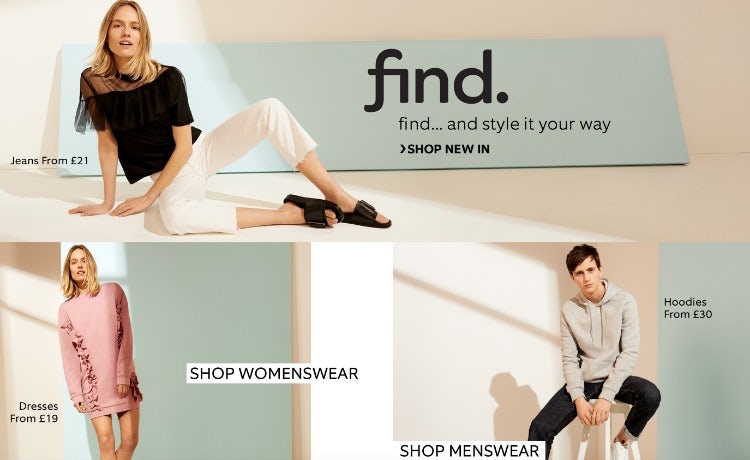Amazon must lose its utilitarian image if it wants to become a credible fashion player
Amazon is hoping to muscle its way into the fashion market with the launch of its own-label fashion brand, but to pose any real threat to the likes of Asos and Boohoo it must shed its utilitarian image.

On-demand grocer, AI pioneer and Oscar winner, Amazon has now added own-brand fashion house to its growing list of achievements.
The next stage of its world domination, the ecommerce giant quietly unveiled two brands for the UK and Europe – lingerie specialist Iris & Lily and newly-launched men’s and womenswear concept, Find. Both will be sold alongside more than 350 branded collections from the likes of Warehouse, Levi’s and Ted Baker.
Flying largely under the radar in marketing terms, these new UK fashion brands will also sit alongside seven private US labels launched over the past year – Goodthreads, Amazon Essentials, Paris Sunday, Mae, Ella Moon, Buttoned Down and Lark & Ro – all of which are exclusive to Prime members.
From a supply chain perspective the move into own-label is a shrewd one. Accelerating inflation and declining promotional activity has prompted consumers to turn to cheaper own-brand alternatives.
READ MORE: How own-label brands are dialling up desirability
Furthermore, as international supply chains are rocked by pricing issues, shortages and delays, Amazon’s ability to control the production of its own-brand fashion, from design to marketing, will help the company weather the financial storm.
The case for own-brand fashion is already proven. Currently £1 in every £5 is spent on a Designers at Debenhams product, while John Lewis’s managing director Paula Nickolds stated in March her hope that half the department store’s range will be exclusive own-brand products by 2020.
Shaking up the fashion market
Currently in the trial phase, with a wider launch planned for late summer according to fashion title Drapers, Amazon own-brand Find positions itself somewhere between Primark, H&M, Topshop and Dorothy Perkins, with prices ranging from £8.90 to £64.
While these prices might be in line with the likes of Primark, Amazon’s famously slick delivery service puts the online giant at a distinct advantage over the high street discounter, which steadfastly refuses to sell online.
As well as taking on high street fashion players, Amazon will be hoping its own-brand offer will shake up online giants such as Asos, Zalando and Yoox, with the added benefit for Prime members of unlimited one-day delivery and free returns.
A key rival to consider is fast fashion pure-play Boohoo, which on 26 April announced a stunning 97% increase in pre-tax profit to £30.9m, compared to the previous year. In the 12 months to 28 February, the Manchester-based retailer’s revenue rocketed £100m to £294.6m. The website currently has 5.2 million active customers, up 29% on the same period last year.
Another serious competitor that will surely be on Amazon’s radar is Missguided. The fast fashion favourite grew revenues by 75% to £206m in the year to March 2017, with international sales surging 130% during the period. Previously an online only player, Missguided decided to flesh out its multichannel strategy in November with the opening of a 21,000 sq ft flagship store in Westfield Stratford.
In a bid to take on fast fashion powerhouses like Asos, Boohoo and Missguided, Amazon Fashion has beefed up its personnel, poaching former Marks & Spencer womenswear director Frances Russell last year. This year alone Amazon appointed M&S head of design for womenswear and accessories, Karen Peacock, as design director and brought Primark menswear buying director Glen George into the fold.
So, is own-label the answer?
Amazon’s play for the fashion market is clearly no idle boast. The launch of Find coincides with the unveiling last week of the Amazon Echo Look. Pitched as the first AI fashion assistant, Look allows users to take hands-free photos or videos of their outfits, which can be saved into a ‘lookbook’. The device also provides outfit feedback courtesy of its AI Style Check feature.
Combining technology, rich data and seamless service, Amazon could prove a real threat to online fashion brands and high street retailers alike. However, despite the high profile hires Amazon has work to do to prove itself as a serious fashion player.
To truly compete with trendsetters like Asos and Boohoo, Amazon will need to shed its utilitarian image and use marketing to carve out an authentic brand positioning for each own-brand collection, or risk slipping firmly under the fashion radar.







